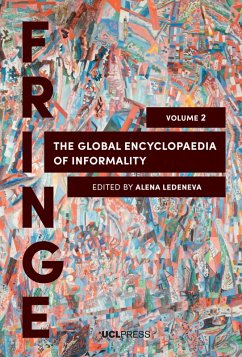Alena Ledeneva invites you on a voyage of discovery to explore society's open secrets, unwritten rules and know-how practices. Broadly defined as 'ways of getting things done', these invisible yet powerful informal practices tend to escape articulation in official discourse. They include emotion-driven exchanges of gifts or favours and tributes for services, interest-driven know-how (from informal welfare to informal employment and entrepreneurship), identity-driven practices of solidarity, and power-driven forms of co-optation and control. The paradox, or not, of the invisibility of these informal practices is their ubiquity. Expertly practised by insiders but often hidden from outsiders, informal practices are, as this book shows, deeply rooted all over the world, yet underestimated in policy. Entries from the five continents presented in this volume are samples of the truly global and ever-growing collection, made possible by a remarkable collaboration of over 200 scholars across disciplines and area studies.
By mapping the grey zones, blurred boundaries, types of ambivalence and contexts of complexity, this book creates the first Global Map of Informality. The accompanying database (www.in-formality.com) is searchable by region, keyword or type of practice, so do explore what works, how, where and why!
Praise for The Global Encyclopaedia of Informality
'The chapter introductions, like many of the entries, subsume a huge quantity of analytical and theoretical reflections of enormous depth. ... If there were door-to-door encyclopedias sellers, this would be a bestseller.'
Periferia
'Suited for graduate students, scholars, and professionals. Recommended.'
Choice
'This unique work collaborates with more than two hundred scholars across the globe, illustrating how informal practices are deeply embedded across the planet, playing a crucial role in truly "getting anything done" while still remaining underestimated in policy-making procedures and business life. The book puts international human behavior into perspective, and is wholly mesmerizing.'
Philly Biz Leaders' Must-Read Books of 2018, Philadelphia Magazine
'The Global Informality Project unveils new ways of understanding how the state functions and ways in which civil servants and citizens adapt themselves to different local contexts by highlighting the diversity of the relationships between state and society. The project is of great interest to policymakers who want to imagine solutions that are benefi cial for all, but sufficiently pragmatic to ensure a seamless implementation, particularly in the field of cross-border trade in developing countries.'
Kunio Mikuriya, Secretary General of the World Customs Organisation, Brussels
'An extremely interesting and stimulating collection of papers. Ledeneva's challenging ideas, first applied in the context of Russia's economy of shortage, came to full blossom and are here contextualized by practices from other countries and contemporary systems. Many original and relevant practices were recognized empirically in socialist countries, but this book shows their generality.'
János Kornai, Allie S. Freed Professor of Economics Emeritus at Harvard and Professor Emeritus at Corvinus University of Budapest
'Alena Ledeneva's Global Encyclopedia of Informality is a unique contribution, providing a global atlas of informal practices through the contributions of over 200 scholars across the world. It is far more rewarding for the reader to discover how commonalities of informal behavior become apparent through this rich texture like a complex and hidden pattern behind local colors than to presume top down universal benchmarks of good versus bad behavior. This book is a plea against reductionist approaches of mathematics in social science in general, and corruption studies in particular and makes a great read, as well as an indispensable guide to understand the cultural richness of the world.'
Alina Mungiu-Pippidi, Professor of Democracy Studies, Hertie School of Governance, Berlin
'Transformative scholarship in method, object, and consequence. Ledeneva and her networked expertise not only enable us to view the informal comparatively, but challenge conventionally legible accounts of membership, markets, domination and resistance with these rich accounts from five continents. This project offers nothing less than a social scientific revolution... if the broader scholarly community has the imagination to follow through. And by globalizing these informal knowledges typically hidden from view, the volumes' contributors will extend the imaginations of those business consultants, movement mobilizers, and peace makers who can appreciate the value of translation from other world regions in their own work.'
Michael D. Kennedy, Professor of Sociology and International and Public Affairs, Brown University and author of Globalizing Knowledge
'Don't mistake these weighty volumes for anything directory-like or anonymous. This wonderful collection of short essays, penned by many of the single best experts in their fields, puts the reader squarely in the kinds of conversations culled only after years of friendship, trust, and with the keen eye of the practiced observer. Perhaps most importantly, the remarkably wide range of offerings lets us "de-parochialise" corruption, and detach it from the usual hyper-local and cultural explanations. The reader, in the end, is the one invited to consider the many and striking commonalities.'
Bruce Grant, Professor at New York University and Chair of the US National Council for East European and Eurasian Research
'The Global Encyclopaedia of Informality represents the beginning of a new era in informality studies. With its wealth of information, diversity, scope, theoretical innovation and artistic skill, this collection touches on all the aspects of social and cultural complexity that need to be integrated into policy thinking.'
Predrag Cveticanin, Faculty of Arts, University of Nis, Serbia
By mapping the grey zones, blurred boundaries, types of ambivalence and contexts of complexity, this book creates the first Global Map of Informality. The accompanying database (www.in-formality.com) is searchable by region, keyword or type of practice, so do explore what works, how, where and why!
Praise for The Global Encyclopaedia of Informality
'The chapter introductions, like many of the entries, subsume a huge quantity of analytical and theoretical reflections of enormous depth. ... If there were door-to-door encyclopedias sellers, this would be a bestseller.'
Periferia
'Suited for graduate students, scholars, and professionals. Recommended.'
Choice
'This unique work collaborates with more than two hundred scholars across the globe, illustrating how informal practices are deeply embedded across the planet, playing a crucial role in truly "getting anything done" while still remaining underestimated in policy-making procedures and business life. The book puts international human behavior into perspective, and is wholly mesmerizing.'
Philly Biz Leaders' Must-Read Books of 2018, Philadelphia Magazine
'The Global Informality Project unveils new ways of understanding how the state functions and ways in which civil servants and citizens adapt themselves to different local contexts by highlighting the diversity of the relationships between state and society. The project is of great interest to policymakers who want to imagine solutions that are benefi cial for all, but sufficiently pragmatic to ensure a seamless implementation, particularly in the field of cross-border trade in developing countries.'
Kunio Mikuriya, Secretary General of the World Customs Organisation, Brussels
'An extremely interesting and stimulating collection of papers. Ledeneva's challenging ideas, first applied in the context of Russia's economy of shortage, came to full blossom and are here contextualized by practices from other countries and contemporary systems. Many original and relevant practices were recognized empirically in socialist countries, but this book shows their generality.'
János Kornai, Allie S. Freed Professor of Economics Emeritus at Harvard and Professor Emeritus at Corvinus University of Budapest
'Alena Ledeneva's Global Encyclopedia of Informality is a unique contribution, providing a global atlas of informal practices through the contributions of over 200 scholars across the world. It is far more rewarding for the reader to discover how commonalities of informal behavior become apparent through this rich texture like a complex and hidden pattern behind local colors than to presume top down universal benchmarks of good versus bad behavior. This book is a plea against reductionist approaches of mathematics in social science in general, and corruption studies in particular and makes a great read, as well as an indispensable guide to understand the cultural richness of the world.'
Alina Mungiu-Pippidi, Professor of Democracy Studies, Hertie School of Governance, Berlin
'Transformative scholarship in method, object, and consequence. Ledeneva and her networked expertise not only enable us to view the informal comparatively, but challenge conventionally legible accounts of membership, markets, domination and resistance with these rich accounts from five continents. This project offers nothing less than a social scientific revolution... if the broader scholarly community has the imagination to follow through. And by globalizing these informal knowledges typically hidden from view, the volumes' contributors will extend the imaginations of those business consultants, movement mobilizers, and peace makers who can appreciate the value of translation from other world regions in their own work.'
Michael D. Kennedy, Professor of Sociology and International and Public Affairs, Brown University and author of Globalizing Knowledge
'Don't mistake these weighty volumes for anything directory-like or anonymous. This wonderful collection of short essays, penned by many of the single best experts in their fields, puts the reader squarely in the kinds of conversations culled only after years of friendship, trust, and with the keen eye of the practiced observer. Perhaps most importantly, the remarkably wide range of offerings lets us "de-parochialise" corruption, and detach it from the usual hyper-local and cultural explanations. The reader, in the end, is the one invited to consider the many and striking commonalities.'
Bruce Grant, Professor at New York University and Chair of the US National Council for East European and Eurasian Research
'The Global Encyclopaedia of Informality represents the beginning of a new era in informality studies. With its wealth of information, diversity, scope, theoretical innovation and artistic skill, this collection touches on all the aspects of social and cultural complexity that need to be integrated into policy thinking.'
Predrag Cveticanin, Faculty of Arts, University of Nis, Serbia
Dieser Download kann aus rechtlichen Gründen nur mit Rechnungsadresse in A, D ausgeliefert werden.









